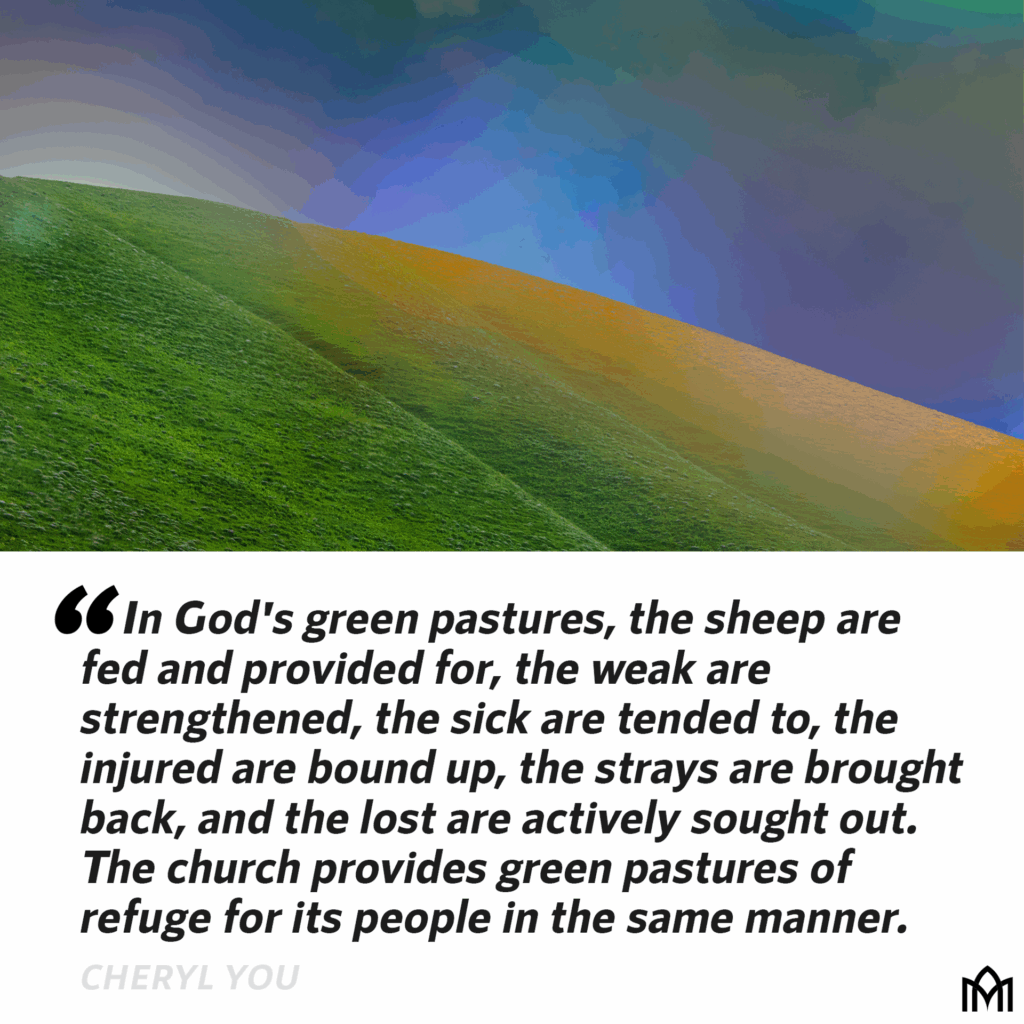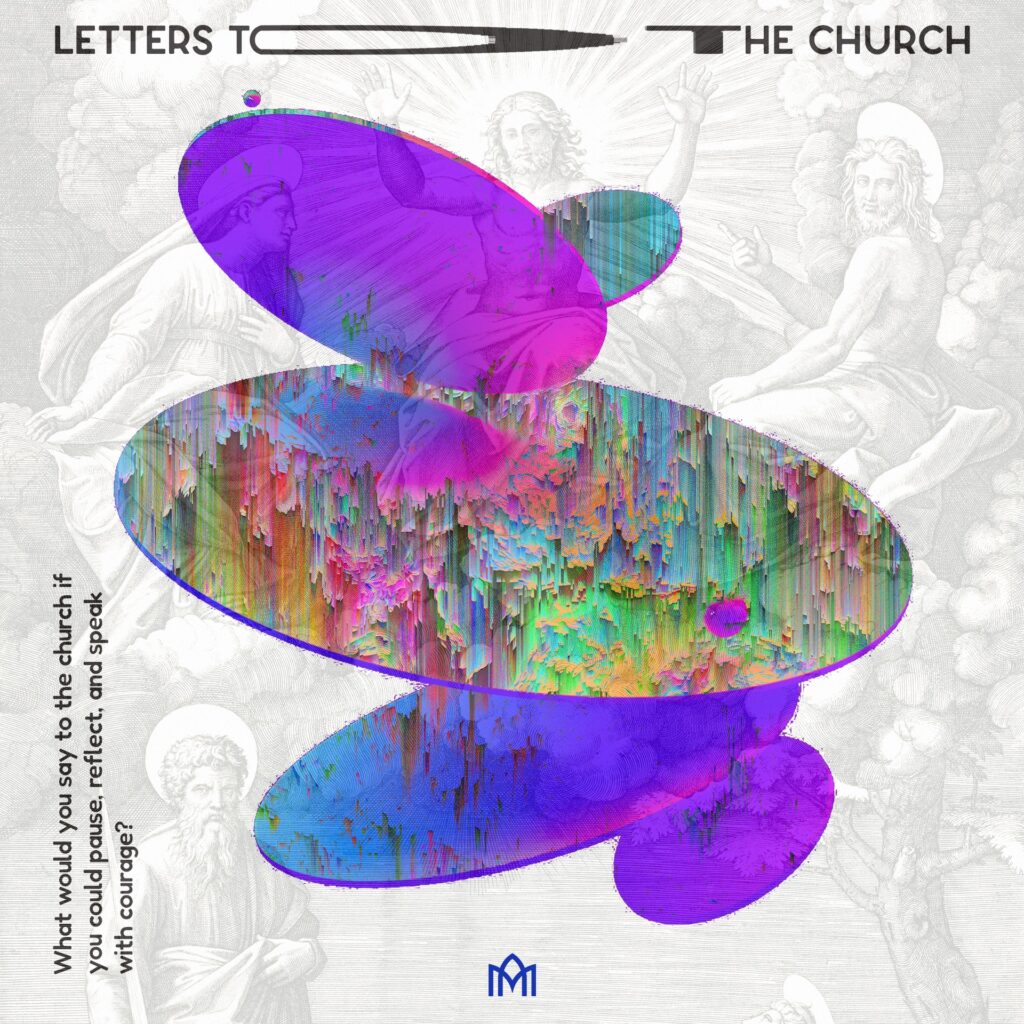Green Pastures of Refuge
Is the Church a Place of Safety?
Dear Church,
Our churches should be places of safety and security. They should thrive as places where all people are welcomed, seen through the eyes of Jesus, known and loved, and empowered to flourish in their unique callings and identities. In particular, people who are vulnerable, suffering, and broken should find safety in the church, their pain honored and tended to.
While so many are leaving the church wounded and disillusioned, some even convinced that the church no longer holds the answer, I believe that God has not yet given up hope on the church. The beginning of justice is when things that have been hidden are finally exposed in the light. (Luke 8:17; Psalm 37:5-6). It can be disheartening to hear about story after story of harm and abuse within the church and Christian institutions, knowing that with every story that comes to light, there are many more that will never reach public awareness. With each story that emerges, I find myself teetering on the brink of cynicism, giving in to the temptation to throw my hands up in the air in helplessness at the magnitude of the problem. Can we ever get this right? And yet, I can’t help but think that these stories of trauma, abuse, and harm collectively form a clarion call for the Church to be roused from its slumber, awakening to the work of repentance and restoration that is urgently needed in our time.
Paul and other New Testament writers often used metaphors to help us imagine what life within the community of faith could look like. Metaphors such as a human body and its various members (1 Corinthians 12), or a temple and living stones (1 Peter 2) are reminders that the church is alive, a complex organism that reflects the glory of Christ. Which metaphors will help us in our day to recapture an imagination for our communities to be safer and healthier spaces? There is an urgent need in our day to return to the Scriptural stories of compassion, authentic community, and empowerment that ring out. In this light:
I want to suggest the pasture as a metaphor that will be helpful for us to reflect on our Churches.
Pasture
Pastures convey a sense of security and safety, where sheep can lie down, unafraid of attack from wild animals, as their shepherd keeps watch over them. In Ezekiel 34, God delivers a scathing rebuke against the shepherds of the land who have neglected and abused their roles as shepherds to the people:
Should not shepherds feed the sheep? You eat the fat; you clothe yourselves with the wool; you slaughter the fatted calves, but you do not feed the sheep. You have not strengthened the weak; you have not healed the sick; you have not bound up the injured; you have not brought back the strays; you have not sought the lost, but with force and harshness you have ruled them. So they were scattered because there was no shepherd, and scattered they became food for all wild animals. My sheep were scattered; they wandered all over the mountains and on every high hill; my sheep were scattered over all the face of the earth, with no one to search or seek for them (Ezekiel 34:2b-6).
If we were to “reverse engineer” this passage, we see a picture of what, in God’s mind, a healthy flock tended by good shepherds actually looks like. In God’s green pasture, the sheep are fed and provided for, the weak are strengthened, the sick are tended to, the injured are bound up, the strays are brought back, and the lost are actively sought out. The community is led with gentleness and humility, provided with protective care, and free of wolves that prey on the vulnerable.
It is a place where people who are hurting and suffering experience sufficient safety and courage to show their wounds, revealing the parts of themselves that are in deep pain and needing to be tended to once again. Authentic relational connection does not thrive in the presence of self-protection. It is only when people are safe enough that they are able to let down their walls and connect with others to receive healing. This safety is built into a culture when every person knows they are regarded as a fellow Image-Bearer, their voice heard. For the first time (ever, or in a long time), they experience mutuality in relationship, where the community is actively willing to embrace them as they are, suspending judgment in order to listen, attune, and support. Safety comes from experiencing leaders who do not wield power to control or dominate but, in Jesus’s gentle and tender way, are willing to exercise openness, curiosity and compassion.
Diane Langberg describes this grace-filled reality as a church that provides green pastures of refuge for its people, writing“When the church follows its Head, then it is a refuge for the flock, with green pastures, clear waters, and restoration for wounded sheep; most certainly a place free of wolves.”1Diane Langberg, When the Church Harms God’s People, 119.
While so many are leaving the church wounded and disillusioned, I believe that God has not yet given up hope on the church. The beginning of justice is when things that have been hidden are finally exposed in the light. Share on X
Where Do We Begin?
How do we begin turning the church slowly towards a place of healing of this magnitude? How do we create safer and healthier spaces? It is important that we avoid seeking out quick-fixes. Drafting policies or mandating trainings for staff and volunteers, while critical, is only the start. What we need is a change of heart. What we need is repentance.
Repentance, Langberg describes, is “long, slow, consistent change over time that comes from the heart outward. It takes far longer than we want to admit.”2iBid., Langberg, 102.Repentance, according to Scripture, is a total and holistic return to God’s heart and ways. In Micah 6:6-8, the speaker asks how he needs to atone for his sin, arrogantly assuming that ritual sacrifice and extravagant performative action will win God over. Instead, the prophet asserts that what God requires is faithfulness to God’s covenant and ways, something that is already evident in the teachings of Israel: “He has told you, O mortal, what is good; and what does the Lord require of you but to do justice, and to love kindness, and to walk humbly with your God?” (Micah 6:8, NRSV).
I would like to frame the way forward for our churches through using the three ‘good elements’ found in Micah 6:8: (1) Walk humbly, (2) Love kindness, and (3) Do justice.
- Walk Humbly: Walking humbly begins with an acknowledgement that God is God and we are not.
Pastor and author Mandy Smith calls attention to our “practical atheism,”3Mandy Smith, Confessions of an Amateur Saint (2024). where our propensity for self-sufficiency betrays our lack of faith in God. To walk in humility is to confess our weakness and our lack of answers. It is to deny our triumphalism and embrace the way of the cross. The crucifixion is not something we simply move past so we can focus on to happier things like the resurrection. Instead, the theology of the cross is central to our entire being as humans, both individually and collectively. Jurgen Moltmann agrees with this perspective, identifying the cross as the “test of everything which deserves to be called Christian.”4Jurgen Moltmann, The Crucified God. Embracing a theology of the cross helps us to grow in willingness to listen instead of speaking, and to hold space for the stories of suffering rather than offering easy answers. We grow in willingness to acknowledge our own capacity to wound others, and correspondingly our need to act to repair when we do.
- Love Kindness: The Hebrew word translated “kindness” in Micah 6:8 is ‘hesed,’ often used to describe God’s covenantal, faithful love.
It is a “thick” word, imbued with deep meaning. ‘Hesed’ is the love God shows to Israel when he rescues them from slavery and pledges himself to them in his covenant. It is the love God shows when Israel remains unfaithful, choosing instead to pursue them over and over. Even when God disciplines the Israelite people in exile, it is because of God’s hesed that he promises ultimate restoration and return. New Testament scholar Scot McKnight defines ‘hesed’ as “a rugged commitment”5Scot McKnight, Pastor Paul, 42. to another. Those of us who proclaim Christ are called to walk in that kind of love toward others. In Pastor Paul, McKnight unpacks God’s ‘hesed’ as “covenant, presence, and advocacy, leading to cruciformity.”6iBid., McKnight, Pastor Paul.
- Do Justice: Michael J. Rhodes, author ofJust Discipleship, writes that justice is “who we are and what we do”7Michael J. Rhodes, Just Discipleship. as stewards of creation made in the Image of God, who has righteousness and justice at the foundation of his throne (See Psalm 89:14).
As “royal priestly family members,” a central way we express our identity as Image-Bearers is to embody God’s work of justice, which Rhodes describes as “active, intervening, rescuing, liberating, [and] laboring.”8iBid., Rhodes. This requires us to have a more expansive view of the gospel than merely escaping eternal damnation. We need to recover Paul’s grand vision of the gospel as a cosmic restoration of all things, where God triumphs over the powers of sin and evil and redeems all creation from the distortion of death and corruption (See Colossians 3). As we place our faith in Christ, we now participate in his death, awaiting the promise of resurrection (Romans 8). While the impact of sin is still evident all around us, we have been given the Spirit as the first fruit that enables us to embody the New Creation in “our present evil age.” We are called to work to tear down the social hierarchies within our midst, exercising solidarity with the “least of these” by relinquishing our status and privilege, pursuing equitable belonging for the marginalized. As we live in this manner, we are participating in God’s justice, pointing to God’s Kingdom that is to come.
In God's green pastures, the sheep are fed and provided for, the weak are strengthened, the sick are tended to, the injured are bound up, the strays are brought back, and the lost are actively sought out. The community is led with… Share on X
The Welcome Rest Oak Trees Invite
The building our church is fortunate to gather to worship in is surrounded by large oak trees. Large oaks are stately trees, having grown slowly over decades, their branches extensive in their grandeur. There is something about these trees that convey a sense of invitation and welcome. Wordlessly, they beckon you to come and sit under their shade, breathing in the fresh oxygen they produce. They exude an invitational stillness that says, “Come and rest. You don’t need to perform. Just be, for you are home.”
That’s what I imagine the entryway into our church community to be like: An invitation to rest and recover.
///
Then I myself will gather the remnant of my flock out of all the lands where I have driven them, and I will bring them back to their fold, and they shall be fruitful and multiply. I will raise up shepherds over them who will shepherd them, and they shall no longer fear or be dismayed, nor shall any be missing, says the Lord. (Jeremiah 23:3-4)
I find great hope in God’s promise to look for scattered sheep, to bring them home where they can flourish. He promises to raise up shepherds who will faithfully shepherd them. Even now, God is working through faithful women and men who are committed to walking humbly, loving kindness, and doing justice in the spaces to which they are called. Throughout Scripture, God works with remnants instead of the masses. While we are seeing an endless avalanche of people experiencing harm and unhealth in their churches, God is not sitting idly by. As God has always done with his people, God is preparing a faithful remnant, the ones who are taking action to live faithfully by God’s ways, standing for what is good and true. It can feel discouraging and lonely to labor on when change does not seem to be anywhere on the horizon. But as always, this is God’s work, not ours. God calls us to join in the work of co-creation, entrusting the outcome to him.
“What’s the point?,” you might ask. “Will it make any difference?”
Perhaps not in the ways we imagine. But just as the prophets Ezekiel and Jeremiah did not get to witness the restoration which they attested to, we faithfully take our place in the drama of God’s story. Just as those who planted the oak trees around our church did not get to experience their full shade and beauty, we plant our “yes” into the soil of God’s Kingdom, hanging on to the glimpses of future promise for generations to come.
///
*Editorial Note: Letters to the Church is Missio Alliance’s newest long-form series. The latest letter to our growing collection will go live each Friday throughout the rest of 2025. We invite you to prayerfully listen to the Spirit as you read, asking God what you might say to the Church in your own voice. ~CK
“Anyone with ears to hear must listen to the Spirit and understand what God is saying to the churches.” (Revelation 2:29)
Especially for those who have experienced harm in the church, safety comes from experiencing leaders who do not wield power to control or dominate but, in Jesus's gentle and tender way, are willing to exercise openness, curiosity… Share on X





